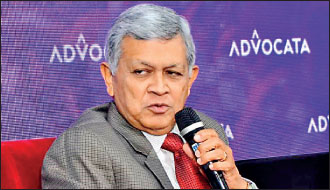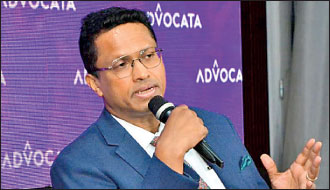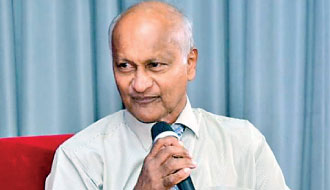Monday Feb 23, 2026
Monday Feb 23, 2026
Thursday, 7 March 2024 00:23 - - {{hitsCtrl.values.hits}}

Jeevan Thondaman

Niraj De Mel

Dilhan C Fernando

Dr Roshan Rajadurai

Dasarath Dassanayake

Sudaraka Ariyaratne

Murtaza Jafferjee

Rehana Thowfeek
The Ceylon tea industry faces significant challenges which threaten its competitiveness and sustainability in the global market. High labour costs, labour shortages, and inefficiencies in
land management are hindering productivity and profitability, while issues pertaining to quality control and lack of a premiumisation strategy poses further obstacles to unlocking the true potential of Ceylon tea.
Advocata Institute Research Consultant Sudaraka Ariyarathna shed light on the discrepancy between recommended replanting rate and the actual rate, mentioning that “while the recommended replanting rate stands at 2.5%, our research indicates a significantly lower actual rate,” highlighting the impact on Sri Lanka’s tea production yields compared to other black tea producing nations. This was the opening to “A deep dive into the market competitiveness of Ceylon tea” organised by Advocata Institute which was on 29 February. The event was aimed at addressing these challenges and fostering inclusive and progressive decision-making within the industry.
Central to the event was the launch of the report titled “Market Competitiveness of the Tea Industry of Sri Lanka,” authored by Sudaraka Ariyaratne. Out of the four topics covered in the report namely, labour market, capital investment, value addition, and quality control, Sudaraka presented his case on two joint topics “Land and Labour Reforms: Efficiency through Liberalisation” and “Quality Control and Premiuimisation: Unlocking the true potential of Ceylon tea”. These two topics formed the focal points of the two panel discussions
For the first panel discussion, Sudharaka highlighted the dwindling local employment in tea estates, resulting in labour migration and a significant shortage of workers. However, he pointed out that some smallholders have demonstrated potential with a revenue share model, enabling workers to earn up to Rs. 80,000 a day.
Water Supply and Estate Infrastructure Development MP, Cabinet Minister Jeevan Thondaman underscored critical challenges faced by the Ceylon tea industry. Emphasis was placed on the importance of land ownership rights being framed as not charity, but reparations for long-standing discrimination. He highlighted the significance of providing a financial foundation for individuals to begin their journey, citing the example of families requesting 10 perches of land, equating to approximately 170,000 families facing housing and land issues. Minister Thondaman revealed the challenges faced in addressing the crisis, with only 150 houses being built annually. He underscored that merely providing houses is not a comprehensive solution, emphasising the need for sustainable plans that empower communities and families to thrive independently.
State Ministry of Company Estate Reform Plantation Management Monitoring Division Former Director Dr. Romesh Bandaranaike who joined the discussion from overseas online expressed the importance of prioritising employee well-being in companies. He also noted “a comprehensive plantation evaluation was conducted in 2018/2019, revealing that political influences heavily dictate policy-making processes.”
Hayley’s Plantations Managing Director Dr. Roshan Rajadurai also emphasised the importance of prioritising employee wellbeing in companies for increased earnings, suggesting that “flexible work arrangements can significantly enhance workers’ quality of life, with some thriving under revenue-sharing models.”
In the second panel, Sudaraka Ariyarathna suggested considering alternative solutions such as premiumisation, the privatisation of estate housing, and the implementation of automation to improve efficiency and competitiveness within the industry.
Tea Board Chairman Niraj De Mel expressed optimism about securing EU (European Union) protection for Ceylon tea within the next 12-18 months. De Mel emphasised the need to prioritise quality over volume, advocating for a return to basics to improve prices. Though acknowledging the benefits of digitisation, he cautioned that it wouldn’t resolve all issues in the digital market. The importance of the strong implementation of regulations to address industry challenges effectively, like the Tea Control Act of 1957, were underscored. Further stressed was the collective responsibility of all stakeholders in achieving premiumisation by adhering to established rules: “We should be the Glenfiddich of Tea and not the VAT 69”.
Dasarath Dassanayake proposed the development of a model to analyse leaf availability in specific regions and that “distributing it among tea factories is essential for optimising production efficiency.” He expressed concern over the drastic changes witnessed in the tea industry, noting the abundance of labour, high yield from tea bushes, and well-supported infrastructure in the past. Refuse tea rates increasing from less than 3% to 15%-25% is another significant issue.
Dilhan Fernando began with acknowledging the challenges involved in premiumising tea domestically and globally. Further states that, “the auction market is a democratic, relevant market place. The market place is a good way of ascertaining the true value of tea”. Argues for meeting consumer demands for ethics and sustainability over competing with other regions. Further underscores the necessity of “establishing a unique market position and garnering support from all stakeholders,” though a formidable task.
The full report, encapsulating these discussions and more, is now available on the Advocata Institute website. Additionally, the panel discussions can be accessed on the Advocata Institute’s YouTube channel shortly.